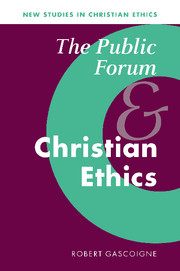Book contents
- Frontmatter
- Contents
- General editor's preface
- Acknowledgements
- Introduction
- 1 Revelation and reason in liberal societies
- 2 Revelation and a contemporary public ethics
- 3 The theology of revelation and Christian identity
- 4 The communication of Christian ethics in the public forum
- 5 Reconciling autonomy and community
- Select bibliography
- Index
2 - Revelation and a contemporary public ethics
Published online by Cambridge University Press: 22 August 2009
- Frontmatter
- Contents
- General editor's preface
- Acknowledgements
- Introduction
- 1 Revelation and reason in liberal societies
- 2 Revelation and a contemporary public ethics
- 3 The theology of revelation and Christian identity
- 4 The communication of Christian ethics in the public forum
- 5 Reconciling autonomy and community
- Select bibliography
- Index
Summary
In liberal and pluralist societies, it is a widespread belief that the resources for a public ethics should exclude religious traditions. For this perspective, a public ethics must be exclusively based on what can be perceived and known in common, and this cannot include the particular beliefs of religious communities, based as they are on controversial claims to revealed truth. The common bonds that can give pluralist societies ethical solidarity are to be found – it is argued – in various understandings of reason and of nature. Yet, as I have maintained, without nourishment from an ontology of the human, ‘reason’ and ‘nature’ are subject to a reductionism which cannot sustain a public ethics. Such an ontology of the human can only be found in those experiences and concepts which disclose the reality of human value. Ultimately, this search raises the question of religion and revelation, whose relevance to a public ethics of human value in community must be raised in a new context, overcoming the limitations of the thought-world of the Enlightenment.
This chapter examines contemporary attempts to develop a basis for a universal and public ethics from human rationality, with particular reference to the neo-Kantian tradition. This tradition seeks to establish links between individual autonomy and universal ethical community – an attempt rejected both by reductionist philosophies and by the revival of ethics based in tradition and narrative.
- Type
- Chapter
- Information
- The Public Forum and Christian Ethics , pp. 45 - 93Publisher: Cambridge University PressPrint publication year: 2000



